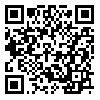Volume 9, Issue 1 (3-2021)
CPJ 2021, 9(1): 1-20 |
Back to browse issues page
Download citation:
BibTeX | RIS | EndNote | Medlars | ProCite | Reference Manager | RefWorks
Send citation to:



BibTeX | RIS | EndNote | Medlars | ProCite | Reference Manager | RefWorks
Send citation to:
kiani Z, moradi A, kadivar P, Hasanabadi H R, keramati H, Effatpanah M. Designing, developing and validating a Psycho-Educational program of Mindfulness-Based Cognitive empowerment to Executive Functions in Children with Attention Deficit Hyperactivity Disorder. CPJ 2021; 9 (1) :1-20
URL: http://jcp.khu.ac.ir/article-1-3358-en.html
URL: http://jcp.khu.ac.ir/article-1-3358-en.html
Zhaleh Kiani 
 , Alireza Moradi *
, Alireza Moradi * 
 , Parvin Kadivar
, Parvin Kadivar 
 , Hamid Reza Hasanabadi
, Hamid Reza Hasanabadi 
 , Hadi Keramati
, Hadi Keramati 
 , Mohammad Effatpanah
, Mohammad Effatpanah 


 , Alireza Moradi *
, Alireza Moradi * 
 , Parvin Kadivar
, Parvin Kadivar 
 , Hamid Reza Hasanabadi
, Hamid Reza Hasanabadi 
 , Hadi Keramati
, Hadi Keramati 
 , Mohammad Effatpanah
, Mohammad Effatpanah 

Department of Educational Psychology, Kharazmi University , moradi90@yahoo.com
Abstract: (7848 Views)
Mindfulness is one of the effective interventions in improving executive functions. Although this intervention is well documented for adults, but it is less addressed for children, while children with attention deficit / hyperactivity disorder Executive functions are problematic. The purpose of this study is to Designing, developing and validating a psycho-educational program of empowerment based on mindfulness-cognitive for reduce behavioral symptoms and improve executive function in children with attention deficit / hyperactivity disorder. The present study is of the fundamental type, which is in two parts, In the first for designing and development stages was a descriptive - analytic method with a configurative synthesis approach In the second stage For program validation, along with the use of face validity method, content validity method was used quantitatively and Qualitatively method with a panel of 10 experts and Content Validity Ratio (CVR) and Content Validity Index (CVI). The minimum and maximum CVRs for each item or component of the program were calculated as 0/73 and 1, respectively. Also the minimum and maximum CVIs for each item or component of the program were calculated as 0/80 and 1, respectively. Finally, the average content validity index (S-CVI/Ave) for the entire program was calculated as 0/91. This research leads to the preparation of an educational-therapeutic program in three sections: 1- basics, 2- external awareness and 3- internal awareness, which includes the sub-elements of strengthening attention, concentration, awareness of emotions, thoughts, tasks, purpose and impulses. Be. This educational-therapeutic program includes 16 sessions for children and 3 sessions for parents, 120 cards and 20 educational worksheets. The psycho educational program of empowerment based on mindfulness- cognitive for reduce behavioral symptoms and improve executive function in children with attention deficit / hyperactivity disorder has appropriate face and content validity, and has a useful validity for educational, clinical and research uses.
Keywords: Attention Deficit Hyperactivity Disorder, Mindfulness, executive function, psycho-educational program.
Type of Study: Research |
Subject:
Special
Received: 2020/12/1 | Accepted: 2021/01/26 | Published: 2021/03/10
Received: 2020/12/1 | Accepted: 2021/01/26 | Published: 2021/03/10
Send email to the article author
| Rights and permissions | |
 |
This work is licensed under a Creative Commons Attribution-NonCommercial 4.0 International License. |




